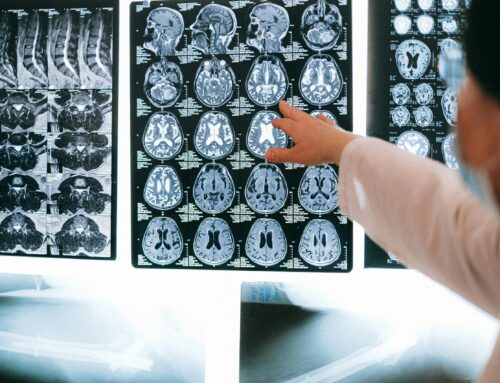As parents, we naturally worry when our children complain of physical symptoms like headaches, stomachaches, or fatigue. While these concerns often have clear medical causes, sometimes extensive testing reveals no underlying physical condition. This doesn’t mean your child is “faking it” or that the pain isn’t real; it may indicate psychosomatic symptoms, an often misunderstood connection between mental and physical health.
In this article, we will explore the mind-body connection in children to help you better support your loved one through psychosomatic symptoms.
What Are Psychosomatic Symptoms?
Psychosomatic symptoms are real physical symptoms that stem from psychological or emotional stress rather than underlying medical conditions. The term “psychosomatic” combines “psyche” (mind) and “soma” (body), reflecting how our mental state can directly impact our physical well-being. These aren’t imaginary complaints. Pain, discomfort, and other symptoms are entirely genuine and more common than most realize.
Common psychosomatic symptoms in children include recurring headaches, stomach pain, chest discomfort, unexplained fatigue, muscle aches, dizziness, and difficulty breathing. These symptoms can be just as distressing and limiting as those caused by physical illnesses, affecting a child’s ability to attend school, participate in activities, and enjoy daily life. As a parent or guardian, watching your child go through this can be very difficult.
Why Children Are Particularly Vulnerable
Children are especially susceptible to psychosomatic symptoms for several developmental reasons. Their nervous systems are still maturing, making them more sensitive to stress and emotional changes. Additionally, children often lack the vocabulary and emotional awareness to express complex feelings verbally, so their bodies may “speak” for them through physical symptoms.
The pressures of childhood, such as academic expectations, social dynamics, family changes, and the constant stimulation of digital media, can create chronic stress that manifests physically. Children who are naturally sensitive, perfectionistic, or highly empathetic may be particularly prone to developing psychosomatic symptoms when overwhelmed.
Autism and Physical Symptoms
Children with autism often experience the world more intensely than their neurotypical peers. Sensory sensitivities, social anxiety, and difficulty processing change can create ongoing stress that manifests physically. Many children with autism have trouble identifying and communicating their emotions, a condition known as alexithymia. When they can’t express their distress verbally, their bodies may communicate through headaches, stomach problems, or other physical symptoms.
What might seem like minor adjustments to neurotypical children can feel overwhelming to those with autism, triggering genuine physical reactions.
ADHD and Somatic Complaints
Children with ADHD often struggle with emotional regulation and heightened sensitivity to stress. Their brains work differently, processing information and emotions more intensely. This can lead to physical symptoms when they feel overwhelmed, frustrated, or anxious about their performance in school or social situations.
The constant effort required to focus and control impulses can be mentally and physically exhausting for children with ADHD. This chronic state of hypervigilance and effort can manifest as headaches, fatigue, stomach problems, or muscle tension. Additionally, the social challenges and academic struggles often associated with ADHD can create ongoing stress that compounds these physical symptoms.
Recognizing Psychosomatic Symptoms
Understanding the patterns of psychosomatic symptoms can help parents and educators identify when a child might benefit from additional support. Key indicators include:
Timing Patterns: Symptoms that consistently appear before stressful events like tests, social situations, or family changes, and often improve during relaxed periods like weekends or school breaks.
Multiple Complaints: A pattern of various, seemingly unrelated physical symptoms that don’t respond well to typical medical treatments or interventions.
Emotional Context: Physical symptoms that coincide with changes in mood, behavior, sleep patterns, or social interactions.
Response to Reassurance: Symptoms that temporarily improve with comfort and attention but return when stress levels rise again.
The Mind-Body Connection
The connection between psychological stress and physical symptoms is rooted in how our nervous system functions. When we experience stress, anxiety, or overwhelming emotions, our body activates its “fight-or-flight” response. This evolutionary survival mechanism floods the system with stress hormones, increases heart rate, tenses muscles, and alters digestion, all of which can create genuine physical discomfort.
In children, this system can be triggered not just by physical danger, but by academic pressure, social conflicts, family stress, or sensory overload. For children with neurobehavioral conditions, everyday situations that others might find manageable can trigger this stress response, leading to chronic physical symptoms.
Supporting Your Child Through Understanding
When psychosomatic symptoms are suspected, the most important first step is validation. Never dismiss your child’s complaints or suggest they’re imaginary. The symptoms are real, and your child needs to know you believe them and want to help.
Creating a calm, supportive environment where children feel safe expressing their emotions is crucial. Sometimes, simply having their feelings acknowledged can begin to alleviate physical symptoms. For children with autism or ADHD, this might involve using visual supports, social stories, or other communication tools that match their learning style.
Establishing predictable routines and clear expectations can help reduce the overall stress load that contributes to psychosomatic symptoms. This is particularly important for children with autism, who thrive on predictability and can become physically stressed when their world feels chaotic or unpredictable.
Practical Strategies for Families
Stress Management Techniques: Teaching children age-appropriate relaxation skills can be incredibly beneficial. This might include deep breathing exercises, progressive muscle relaxation, visualization techniques, or mindfulness activities adapted for their developmental level.
Physical Activity: Regular exercise is one of the most effective ways to manage stress and reduce psychosomatic symptoms. Physical activity helps process stress hormones and releases endorphins that improve mood and reduce pain perception.
Sleep Hygiene: Ensuring children get adequate, quality sleep is essential. Poor sleep can exacerbate both emotional stress and physical symptoms, creating a cycle that’s difficult to break.
Communication Skills: Help children develop vocabulary for emotions and physical sensations. The better they can communicate their internal experience, the less likely they are to express distress through physical symptoms.
The Path Forward
Understanding psychosomatic symptoms represents an important shift in how we view children’s health and wellbeing. Rather than seeing mind and body as separate entities, we recognize their profound interconnection and the need to address both psychological and physical aspects of health.
The key is remembering that psychosomatic doesn’t mean “not real”; it means the connection between mind and body is strong and important. With patience, understanding, and appropriate support, children can learn to manage these symptoms while developing resilience and coping skills that will serve them throughout their lives.
Most importantly, seeking help for psychosomatic symptoms isn’t a sign of weakness or parenting failure. It’s a recognition of the complex, beautiful way our minds and bodies work together, and a commitment to helping your child thrive in all aspects of their health and development.
If you’re concerned about psychosomatic symptoms in your child, especially if they have a neurobehavioral condition like autism or ADHD, contact NeuroBehavioral Associates today. Our experienced team understands the complex relationship between mental and physical health and can provide comprehensive evaluation and treatment tailored to your child’s unique needs.






